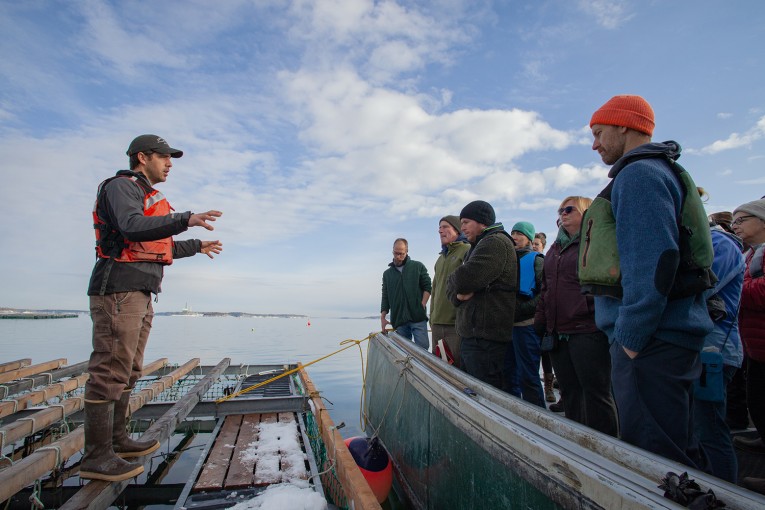Whether you’re talking about your business, your community, or life in general, it’s all about networks.
Most small business owners feel isolated. Running a small business is something you take home with you and on vacations—it’s always in the back of your mind. Now, imagine running a business out on the water where there is rarely an opportunity to share questions, concerns, or ideas around what works for others in a non-competitive environment.
Sharing for solutions is the kind of networking that is built into our Aquaculture Business Development (ABD) program. In addition to bringing aspiring aquaculturists together over a 12-month period to learn aquaculture basics and develop their business plans, the program places a heavy emphasis on connecting the participants with each other as well as individuals operating aquaculture businesses, buyers, and others associated with the industry.
Aquaculture is growing along Maine’s coast—the supply chain between growers and buyers has begun to evolve, and farmers are deciding on the best ways to market their product. One of the biggest challenges farmers face is the “selling” side of their business.
Connecting with peers and colleagues is one of the many ways we help address this and other challenges these new small business owners face. A great example is the annual “Industry Day” event that our ABD program hosts for its participants. This marketing-focused day provides an opportunity for aspiring aquaculturists to establish relationships with buyers, wholesalers, restaurants, and retailers.
“I have been working in the aquaculture industry for nine years, but have no experience starting a business. The ABD program has provided me with important tools and connections to make business decisions.”
–Sarah Wineberg, ABD participant
Our most recent Industry Day, held in Portland in early December, was broken into two parts—a visit by boat to Casco Bay aquaculture farms and afternoon panel sessions on the mainland.
The morning boat ride provided a brisk ride to visit Matt Moretti of Bang’s Island Mussels and learn about the farm’s expansion as well as the integration of kelp around the farm to help benefit shell growth and provide an additional revenue stream. Participants also had the chance to visit Basket Island Oyster Company, where we were lucky enough catch their manager, Lane Hubacz, and his crew shifting oyster bags in preparation to overwinter them on the bottom. Lane explained that this labor-intensive process was key and also spoke about how important it was to work with both landowners along the waterfront (riparians) and fishermen whenever you are starting or expanding an aquaculture business.
After lunch, the group met two panels—one for industry partners and another for farmers. The format consisted of a question-and-answer session to identify strategies to successfully market their businesses.
The farmer panel allowed existing growers to share how they overcame challenges for their businesses, and panelists also discussed how they incorporated technology into their business model to create efficiency and determine metrics critical to their success.
The industry panel created an hourlong session that focused on various topics. Conversations ranged from how to craft long-term relationships with distributors to the best methods for bringing fresh/safe product to a retail establishment. Most importantly, wholesalers and retailers were able to share their perspectives on the fiscal realities they faced and how it drove their businesses from year to year. The day ended with a visit to see George Parr, a longtime seafood wholesaler on Portland’s waterfront, where participants learned about the ins and outs of the seafood business from a wholesale point of view. The key question: “Do you want to simply move product at a good price or build relationships in the direct-to-consumer market?” We learned that there are challenges and benefits to both.
As you can see, networking and building connections with peers and partners in your industry are key pieces in helping your business succeed. For our ABD participants, Industry Day provides an opportunity to establish relationships with the people who can help them take their businesses to the next level. For our industry participants, it helps them share and leverage best practices that will ensure the longevity and sustainability of their industry. No matter what field you work in, finding ways to meet peers and develop these relationships is a great way to exchange ideas, gain new perspectives, work through challenges you may be facing, and stay on top of the latest industry developments.
If you’re feeling inspired and would like more information about aquaculture or any of our other small business support, check out the resources below, and happy networking!
Featured Resources
Aquaculture resources:
- Want to find out more about our Aquaculture Business Development program?
Visit our website and check out this blog post to learn more about the program.
Small business resources:
- Through the Tom Glenn Community Impact Fund, we support fishermen, artists, makers, small businesses, and entrepreneurs in Maine’s coastal and island communities, and connect them to resources that can help improve income stability, business efficiency, and economic productivity, and allow businesses to expand and reach new markets. Learn more here.
Further questions?
For aquaculture-related questions, contact Sam Belknap with the Island Institute’s Aquaculture team. For small business questions, contact Craig Olson with the Small Business team.
What We Do
The Island Institute’s Small Business Team provides business and financial planning to help entrepreneurs navigate the complexities of starting and growing a business. For more information on our small business support services, feel free to contact Craig Olson or Claire Donnelly.
Commercial Currents is an email and blog newsletter that shares buoyant stories from Maine’s island and coastal communities about economic stability and resilience. To find archived editions, go to islandinstitute.org/blog/economic. Subscribe here.


